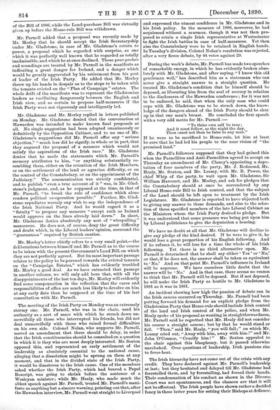The meeting of the Irish Party on Monday was an
extremely stormy one. Mr. Parnell, who was in the chair, used his authority as a sort of mace with which he struck down un- mercifully all those who interrupted his friends, but did not deal unmercifully with those who raised formal difficulties on his own side. Colonel Nolan, who supports Mr. Parnell, moved an amendment that there should be delay, in order that the Irish constituencies should be consulted on a question in which it is they who are most deeply interested. Mr. Sexton opposed this, and represented an early settlement of the leadership as absolutely essential to the national cause, alleging that a dissolution might be sprung on them at any moment, and that in the divided state of the Irish Party, it would be disastrous to the Irish cause. One of the members asked whether the Irish Party, which had braved a Papal Rescript, was going to shrink before the sentence of a Wesleyan minister; while Mr. Healy, who made much the ablest speech against Mr. Parnell, treated Mr. Parnell's mani- festo as anything but a sincere warning, pointing out that, after the Hawarden interview, Mr. Parnell went straight to Liverpool
and expressed the utmost confidence in Mr. Gladstone and in his Irish policy. In the measure of 1886, moreover, he had acquiesced without a murmur, though it was not then pro- posed to retain a single Irish representative at Westminster to fight the Irish battles in case of half-measures. Yet then also the Constabulary were to be retained in English hands. In Tuesday's division, Colonel Nolan's resolution was rejected, after a. very fierce debate, by 44 votes against 29.






















































 Previous page
Previous page